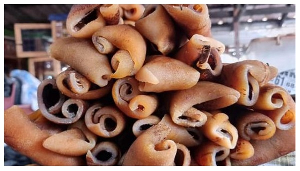 File photo of cowhide, popularly known as Wele
File photo of cowhide, popularly known as Wele
Consumers of cowhide, popularly known as Wele, in Accra are expected to pay higher prices for their beloved delicacy.
A recent survey by The Mirror revealed that the price of Wele has increased significantly, with a piece that previously sold for GH¢3 now costing between GH¢5 and GH¢25.
Food vendors across Accra confirmed the price hike, attributing it to rising costs from suppliers.
Wele, also known as Kehuro, is a staple in many Ghanaian dishes, particularly waakye, a popular rice and beans meal.
However, despite the price increase, vendors noted that almost every waakye stew still includes wele.
Some vendors at major markets like Agbogbloshie, Kaneshie, Adabraka, Jamestown, and Accra Central believe that food vendors could maintain their old prices and still make a profit.
Madam Dora Addo, a wholesaler at Agbogbloshie, mentioned that “I usually buy a full piece for GH¢80 from the importers but now it is sold between GH¢130 and GH¢150.”
She added that the price surge is partly due to the fluctuating exchange rate and high import duties, as many wele importers are based in Kumasi and source unprocessed cowhides from countries like Mali, Burkina Faso, Niger, and Brazil. The cost of a full piece of wele has risen from GH¢80 to between GH¢130 and GH¢150.
Despite these challenges, some wholesalers argue that food vendors are exploiting the situation to increase their profits.
Madam Beatrice Quaye, a wholesaler at Kaneshie, noted that vendors often pass on the costs of other ingredients like pepper, tomatoes, and onions to the price of wele.
“Food vendors just want to take the cost of pepper, tomatoes, and onions all from the sale of wele.”
“I know some sell a piece of wele at GH¢10, meanwhile, we sell enough pieces to them at GH¢10,” she added.
The wele business has become a family venture for many, with younger generations taking over from their parents.
Mariama, a vendor at Agbogbloshie, shared that her family has been in the wele business for generations.
She prefers buying wele from Kumasi due to its better preservation compared to the softer, less durable wele processed in Accra.
At the Jamestown wele processors market, concerns were raised about the hygiene and cooking practices.
Nas Tee, a wele processor, called for proper cooking techniques to ensure the product's quality and longevity.
“One must properly time the cooking. You must pay attention very well or it will become extremely soft for the market women. This will make it go bad in a few days. You must ensure that the state of the fire is under control so it will be well cooked. Also, it has to be turned while cooking,” Nas Tee explained.
Dietician Wise Chukwudi Letsa advised consumers to be cautious with wele, noting that while it contains protein, it is low in essential amino acids and should not be relied upon as the sole source of protein in meals.
“It should not be consumed as the sole source of protein in a meal. I will not advise families to use wele as their go-to protein because there are better options,” he advised.
He also highlighted the health risks associated with poor handling and preparation of wele.
As prices continue to rise, consumers and vendors alike are navigating the challenges to maintain their beloved delicacy in their diets.
ID/MA
Watch the latest edition of BizTech below: